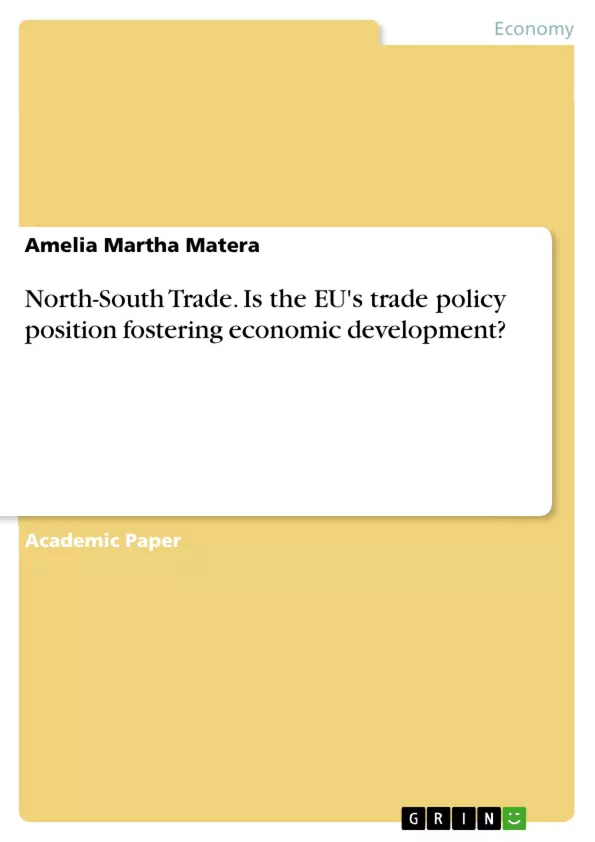The aim of this paper is to understand whether the EU's trade policy position is fostering economic development. According to International Monetary Fund's World Economic Outlook Report, on April 2015 the Developing Countries in the world are 151, this number emphasises the importance of the topic.
The first part gives an overview on the trade theories, in particular the comparative advantage theory. The main analysis of this paper is concentrated on the trade policies used in the Developing Countries (DC) and the EU trade policy and its instruments and their effects. Before getting to the conclusion this paper will highlight the main critics and problems of the EU trade policy.
Inhaltsverzeichnis (Table of Contents)
- Introduction
- Comparative Advantage Theory and Trade
- Trade Policy in Developing Countries
- EU Trade Policy
- EU Instruments
- Conclusion
Zielsetzung und Themenschwerpunkte (Objectives and Key Themes)
This paper aims to investigate whether the European Union's (EU) trade policy is conducive to economic development in developing countries. The analysis focuses on the EU's trade policy instruments and their effects, examining the historical trade policies used in developing countries, and exploring the comparative advantage theory.
- EU Trade Policy's Impact on Economic Development
- Comparative Advantage Theory and its Applications in International Trade
- Trade Policies in Developing Countries: Historical Perspectives and Challenges
- EU Trade Policy Instruments and their Effects
- Challenges and Criticisms of the EU's Trade Policy
Zusammenfassung der Kapitel (Chapter Summaries)
- Introduction: This chapter sets the stage by introducing the EU's prominent role in international trade and the significance of understanding the relationship between its trade policy and economic development in developing countries.
- Comparative Advantage Theory and Trade: This chapter delves into the concept of comparative advantage, explaining how countries can benefit from international trade by specializing in the production of goods where they have a lower opportunity cost. It highlights the potential for increased productivity and economic growth through specialization.
- Trade Policy in Developing Countries: This chapter examines the historical trade policies adopted by developing countries, focusing on the import-substituting industrialization strategy. It discusses the rationale behind this strategy, its effectiveness, and the challenges faced by developing countries in achieving economic growth.
- EU Trade Policy: This chapter provides an overview of the EU's trade policy, tracing its evolution from the establishment of the Customs Union and the Common Agricultural Policy to its current multi-level approach. It highlights the EU's influence on international trade and the changing dynamics of global trade.
Schlüsselwörter (Keywords)
This paper examines the EU's trade policy, focusing on its impact on economic development in developing countries. Key concepts explored include comparative advantage theory, trade policy instruments, import-substituting industrialization, free trade agreements, and the challenges faced by developing countries in achieving economic growth.
Frequently Asked Questions
Does EU trade policy foster economic development in developing countries?
The paper investigates this question by analyzing EU trade instruments and their impact on the growth of the 151 developing nations worldwide.
What is the Comparative Advantage Theory?
It is an economic theory suggesting that countries should specialize in producing goods where they have a lower opportunity cost, leading to global efficiency and growth.
What was the "import-substituting industrialization" strategy?
Many developing countries historically used this strategy to protect domestic industries from foreign competition by restricted imports, though its effectiveness is debated.
What are the main instruments of EU trade policy?
The EU uses customs unions, common agricultural policies, and various free trade agreements to regulate international trade relations.
What are the criticisms of EU trade policy?
Critics often point out that certain EU policies can create barriers for developing countries, potentially hindering their industrial progress despite free trade rhetoric.
- Arbeit zitieren
- Amelia Martha Matera (Autor:in), 2018, North-South Trade. Is the EU's trade policy position fostering economic development?, München, GRIN Verlag, https://www.grin.com/document/442600



